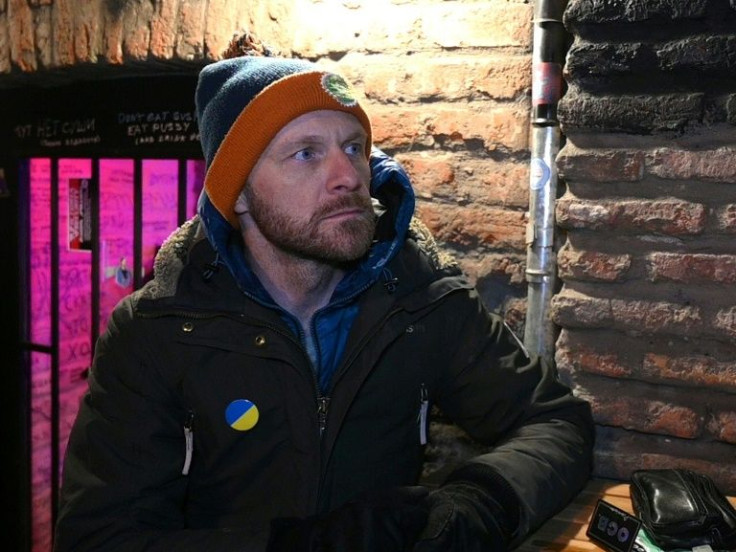Georgia, A Bleak New Home For Russian Exiles
Sitting at a windswept terrace of a tiny bar in Georgia's capital Tbilisi, Russian exile Roman Mikhailov said he had no choice but to leave his country "immediately" when Moscow invaded Ukraine.
The 25-year-old logistics manager said the attack on Ukraine, which shocked the world, was a point of no return for some Russians who oppose President Vladimir Putin's longtime rule.
He is among those Russians who fled in large numbers to Georgia within days -- or even hours -- of Moscow's invasion, to escape asphyxiating Western sanctions and a feared escalation in repression by the authorities.
"The majority of Russians support Putin and it's very hard to be even politically neutral," he told AFP from the Russian expats' favourite bar, deep in the labyrinth of Tbilisi's narrow streets.
"I am against Putin and the only prospect I have in Russia is to end up in prison -- like Navalny."
Opposition leader Alexei Navalny, who led the biggest protests against Putin that Russia has seen in recent years, has been jailed and his political organisations banned.
There are few routes out of Russia for those wishing to leave now. Western airspace is largely closed to Russian carriers.
But Tbilisi has for years served as a hub for Russian opposition circles, and Georgia is one of the few countries where Russians can stay for a year without a visa.
Sipping her beer at a nearby table, computer programmer Marina Boldyreva said she was on holiday in the Black Sea country when Putin announced the attack.

Hearing the news, she decided not to return home to Saint Petersburg, Russia's second city, and turned her break into "an immigration".
It will be "impossible to live in Russia", the 26-year-old said. "It will face a terrible economic crisis."
The new wave of Russian emigres vividly remember what they were doing when they heard news of the invasion, launched by Putin in the early hours of February 24.
"I will remember forever how I learned the war had begun," said Denys Sinyakov, a 44-year-old who works in cinema.
That day he was filming the timeless frescoes of the Dormition Cathedral in the city of Vladimir outside Moscow, regarded as the mother church of Mediaeval Russia.
"I was looking at those frescoes and it was such a surreal feeling. You are in the cradle of Russian civilisation -- those icons that depict darkness and light -- but all I could think of was Ukraine."
His sense of shock was worsened by the fact that his wife is Ukrainian.

"My country attacked my wife's country. I have no moral right to stay in Russia," he said.
Sinyakov said he left behind a newly-built house, where the couple were "dreaming to live".
Not all Russians in Tbilisi agree about Putin's role in Ukraine.
Emotions were running high among the dozen or so exiles queing at an ATM, debating an invasion that has forced so many into immigration.
"I fully support Putin. He does what is good for Russia's interests," said Larisa Shubova, a 55-year-old businesswoman. "Let the world see our might."
"What 'might' are you talking about?" 34-year-old engineer Pavel Gruzdev retorted angrily. "Russia is an outcast now."
The influx of Russians has also sparked mixed feelings among Georgians.
Tbilisi has seen near daily mass rallies in solidarity with Ukraine since Moscow stunned the world with its full-scale attack.
Georgia itself saw a Russian invasion in 2008.
Anti-Russian sentiment is on the rise, with some Western leaders voicing concern that Georgia -- and another pro-Western ex-Soviet republic, Moldova -- could become the Kremlin's next target.
Thousands have signed an online petition demanding the government introduce a visa regime for Russian nationals and tougher immigration rules.
"For those who call this Russophobia, I bet you can hardly imagine what it means to be colonised by Russia," David Gabunia, a prominent Georgian writer, wrote on Facebook.
Boldyreva said when she sees anti-Russian graffiti on the streets of Tbilisi, "I want to say that Russia is not Putin."
She added she had, on several occasions, been beaten "with batons" by police in Russia at anti-Putin protests.
Russia on Sunday detained at least 5,000 anti-war protesters -- an unprecedented number for a single day -- in a bid to stifle criticism of its war in Ukraine.
Boldyreva acknowledged that many of her fellow exiles did not realise Moscow currently occupies a large part of Georgian territory and they would "not be received here with open arms."
"We are not welcome all over the world and it's going to be like this for a long time," she said. "We are pariahs. We are people without a country."
© Copyright AFP {{Year}}. All rights reserved.





















